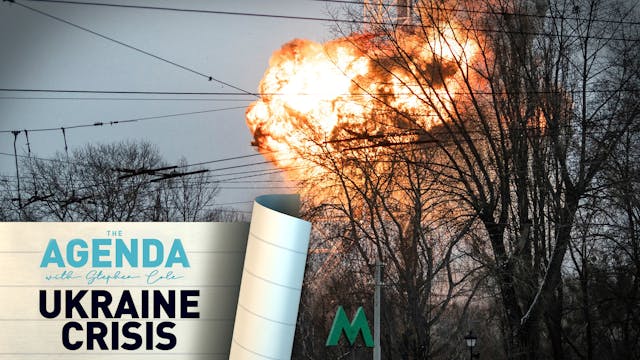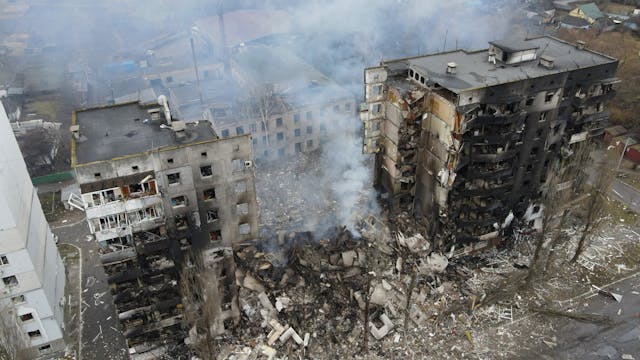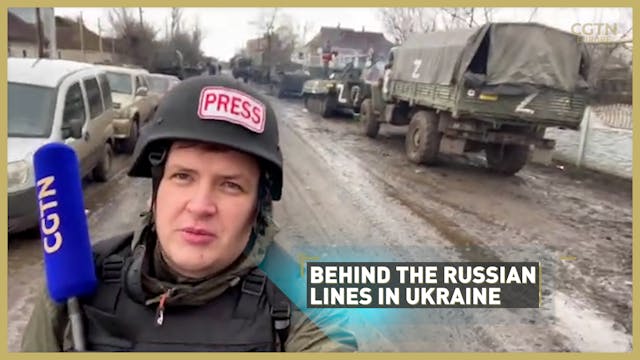What might this mean for Europe?
Ukraine Under Attack
•
14m
The conflict in Ukraine is showing few signs of subsiding, quite the opposite in fact. But just how might it all play out and what will be the lasting impact on geopolitics and the future of Europe?
The Agenda’s Stephen Cole is joined by Frank Furedi - Emeritus Professor of Sociology at the University of Kent, and Jamie Shea - former Deputy Assistant Secretary General for Emerging Security Challenges at NATO's headquarters.
Asked what has prompted the conflict, Frank Furedi says it’s not as simple as pointing the finger:
“It’s a complicated process; it's not as if you can simply blame one side or another...But I think what has occurred is that in the months, maybe even years leading up to the invasion of Ukraine, the European Union hasn't played very much of a role in all the different negotiations. The United States unfortunately signalled the idea that it might be possible for Ukraine to join NATO and thereby making the Russians feel that their security concerns were not being taken seriously by the American president.
“What you had was, I think, a situation where Russia felt that the West was divided. Especially after the humiliating withdrawal from Afghanistan, they must have concluded that there was an opportunity there.”
Asked if NATO should have taken President Putin’s security concerns about expansion more seriously, Jamie Shea tells Stephen Cole there are many examples of NATO-Russia cooperation:
“After NATO began its enlargement, it explicitly told the Russians that, under peaceful circumstances in Europe, it wouldn’t put combat troops, nuclear weapons or infrastructure on the territory of member states. President Putin came regularly to NATO's summit meetings. We had a NATO-Russia council. We met frequently and cooperated with the Russians in places like Afghanistan or fighting pirates in the Gulf of Aden.
“I think that we also need to remember that Ukraine's wish to join NATO only really became active after 2014, when Russia annexed Crimea and the Ukrainians - fearing a threat from Russia -changed their constitution to open the perspective of nature membership. So, in a way, President Putin is like the sort of pyrotechnic fire fighter who causes the problem.”
Asked if President Putin will have been surprised by the turnaround and resolve that has been shown by the West, Frank Furedi says he thinks that’s likely to be the case:
“The very clear perception on the part of Putin and his colleagues was that the West was divided and was, in a sense, not in a position to respond to his assault on Ukraine with any serious force. It must have been shocked by the way in which sanctions were immediately imposed.
“Having said that, there is still hesitancy on the part of different NATO members in the way that they're responding to Russia. For example, the Germans are still very reluctant to cut down or substantially reduce their energy dependence upon Russia.
“So long as America and so long as NATO leave the military option off the table, unity will not be seriously tested because I think it's one thing to unite on providing relief aid for the refugees and put sanctions on an oligarch, it's quite another thing to take that next step in a unified way against the threat.”
For more:
https://www.cgtn.com/europe
Up Next in Ukraine Under Attack
-
The Ukraine Crisis
As the crisis in Ukraine continues to escalate, this week on The Agenda, Stephen Cole considers just how we arrived at the current crisis and what it all could mean for the future of Europe and indeed for the global balance of power.
He speaks to Frank Furedi, Emeritus Professor of Sociology at ...
-
Like a ghost town
See shocking footage from the air and on the ground in Borodyanka and Hatne, just two of the Ukrainian villages decimated by Russian shelling on Thursday.
-
Behind Russian military lines
CGTN reporter Dmitriy Maslak is behind Russian military lines in #Ukraine. This is his report on day 9 of the conflict.



